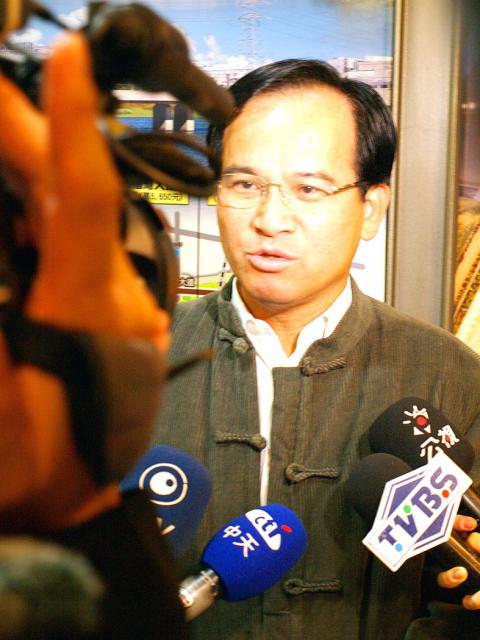Outgoing Tainan County Commissioner Su Huan-chih (蘇煥智) of the Democratic Progressive Party (DPP) yesterday accused prosecutors of discriminating against politicians in the pan-green camp and threatened to launch a protest if they abuse their power.
Su’s remarks came after Tainan prosecutors searched his residence, the county government and a construction company on Friday as they investigated alleged irregularities relating to a development proposal for a special zone in the Southern Taiwan Science Park. They summoned Su at 8pm on Friday to answer -questions about allegations that he had solicited NT$100 million (US$3.34 million) in bribes from the construction company.
The director of the county government’s Urban and Rural Development Department, Wu Hsin-hsiu (吳欣修), was also questioned and released without bail on Friday evening. Su was released without bail after two hours of questioning.

PHOTO: CNA
Prior to the questioning, Su said that the investigation was political persecution and he threatened to stage a hunger strike in front of the Tainan District Prosecutors’ Office.
“I can not tolerate prosecutors choosing DPP politicians as their targets, but sparing Chinese -Nationalist Party (KMT) officials,” he said, referring to a previous investigation into the Taipei City Government’s involvement in the Xinsheng Overpass scandal.
“We didn’t see prosecutors search Taipei Mayor Hau Lung-bin’s (郝龍斌) office or summon him for questioning, nor have we seen prosecutors search the Taipei County Government when Taipei County Commissioner Chou Hsi-wei’s (周錫瑋) secretary was suspected of taking bribes,” Su said.
He also accused the administration of President Ma Ying-jeou (馬英九) of persecuting pan-green politicians to boost Ma’s chances of re-election in 2012.
Denying that it targeted pan-green politicians for investigation, the prosecutors’ office released a statement yesterday saying that it is concerned with whether there are irregularities and finding solid evidence, rather than with the political affiliation of those involved.
The office said that it considered the truth to be black or white, not green or blue, and it urged Su not to overreact.
The prosecutors said the probe stemmed from their suspicion that the Yu-li Construction Co (友力營造公司) had planned to bribe county government officials.
The Taipei-based company had been interested in a county government construction proposal in the special zone, but in the end did not win the bid.
Following Friday’s questioning, Yu-li’s president Lin Cheng-fu (林正富) and a board member surnamed Liang (梁), were detained by Tainan judges after prosecutors filed a request with the judges to have them kept in custody.
According to Su, Yu-li Construction eventually gave up its bid and consequently did not win.
“Given that, how could a company be involved in an alleged scandal without any business contract with the county government?” Su asked.
Commenting on the case, the DPP said Su has a good reputation and was known as a person of integrity and that the party believed he is a clean politician. Su is to step down from his county commissioner post on Dec. 24 as Tainan County officially merges with Tainan City and is upgraded to a special municipality on Dec. 25.
ADDITIONAL REPORTING BY STAFF WRITER

SECURITY: As China is ‘reshaping’ Hong Kong’s population, Taiwan must raise the eligibility threshold for applications from Hong Kongers, Chiu Chui-cheng said When Hong Kong and Macau citizens apply for residency in Taiwan, it would be under a new category that includes a “national security observation period,” Mainland Affairs Council (MAC) Minister Chiu Chui-cheng (邱垂正) said yesterday. President William Lai (賴清德) on March 13 announced 17 strategies to counter China’s aggression toward Taiwan, including incorporating national security considerations into the review process for residency applications from Hong Kong and Macau citizens. The situation in Hong Kong is constantly changing, Chiu said to media yesterday on the sidelines of the Taipei Technology Run hosted by the Taipei Neihu Technology Park Development Association. With

CARROT AND STICK: While unrelenting in its military threats, China attracted nearly 40,000 Taiwanese to over 400 business events last year Nearly 40,000 Taiwanese last year joined industry events in China, such as conferences and trade fairs, supported by the Chinese government, a study showed yesterday, as Beijing ramps up a charm offensive toward Taipei alongside military pressure. China has long taken a carrot-and-stick approach to Taiwan, threatening it with the prospect of military action while reaching out to those it believes are amenable to Beijing’s point of view. Taiwanese security officials are wary of what they see as Beijing’s influence campaigns to sway public opinion after Taipei and Beijing gradually resumed travel links halted by the COVID-19 pandemic, but the scale of

A US Marine Corps regiment equipped with Naval Strike Missiles (NSM) is set to participate in the upcoming Balikatan 25 exercise in the Luzon Strait, marking the system’s first-ever deployment in the Philippines. US and Philippine officials have separately confirmed that the Navy Marine Expeditionary Ship Interdiction System (NMESIS) — the mobile launch platform for the Naval Strike Missile — would take part in the joint exercise. The missiles are being deployed to “a strategic first island chain chokepoint” in the waters between Taiwan proper and the Philippines, US-based Naval News reported. “The Luzon Strait and Bashi Channel represent a critical access

Pope Francis is be laid to rest on Saturday after lying in state for three days in St Peter’s Basilica, where the faithful are expected to flock to pay their respects to history’s first Latin American pontiff. The cardinals met yesterday in the Vatican’s synod hall to chart the next steps before a conclave begins to choose Francis’ successor, as condolences poured in from around the world. According to current norms, the conclave must begin between May 5 and 10. The cardinals set the funeral for Saturday at 10am in St Peter’s Square, to be celebrated by the dean of the College